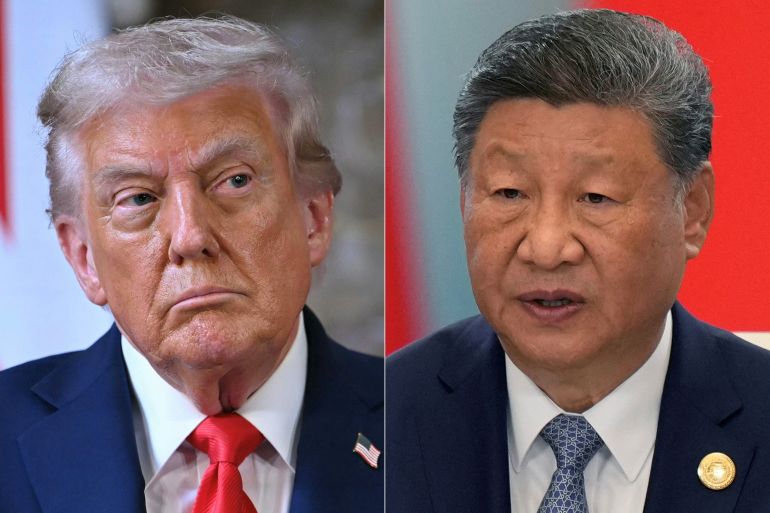Trump-Xi call thaws US-China relations, but no clear TikTok deal yet
While the leaders had ‘broken ice’ with the call, it also showed that Trump was in no place to impose more tariffs.

By Megha Bahree
Published On 19 Sep 202519 Sep 2025
Save
United States President Donald Trump has spent the better part of this week touting a TikTok “deal” with China, but experts say it is far from finalised after both sides shared details of his phone call with President Xi Jinping.
The two leaders spoke by phone on Friday, their first call in three months, but there was no announcement of the sale of the popular social media app that has 170 million US users.
Recommended Stories
list of 4 itemsend of list
While Trump, in a post after the call on Truth Social, said “It was a very good call … appreciate the TikTok approval”, the version from Beijing was not as clear.
“On TikTok, Xi said China’s position is clear: the Chinese government respects the will of firms and welcomes companies to conduct business negotiations on the basis of market rules to reach a solution consistent with Chinese laws and regulations while balancing interests,” according to the meeting summary in Xinhua, the Reuters news agency reported.
Experts were not surprised.
“Trump is the type of person who often announces frameworks or deals to have deals or a deal that still has a lot of details to be worked out, and this seems to be another example of that,” said Rachel Ziemba, adjunct senior fellow at the Center for a New American Security.
The bigger trade deal is likely to wait till Trump and Xi meet on the sidelines of the Asia-Pacific Economic Cooperation forum that starts on October 31 in Gyeongju in South Korea, “if that happens”, added Ziemba.
Despite the lack of any specific developments from Friday’s call, experts agree that the leaders talking is in itself a sign of a thaw, especially as Xi had previously refused to get on the phone with Trump, despite the multiple meetings in Geneva, London and most recently in Madrid.
Advertisement
“At least they have broken ice after a long while, and it seems like they are ready to negotiate other more difficult issues,” said Wei Liang, a professor at Middlebury Institute of International Studies, where she specialises in international trade and Chinese foreign economic policy, among other topics.
Some scholars, she said, had likened the last few months as worse than the peak of the Cold War between the US and the former Soviet Union, where leaders of the two countries at least had a hotline in place.
The call was days after Trump extended, for the fourth time, a deadline for China’s ByteDance to divest its ownership of TikTok or face a ban in the US under a law passed last year with overwhelming bipartisan support and one that was later upheld by the Supreme Court.
“It will be a very complicated transaction, if it happens,” said Robert Rogowsky, adjunct professor of trade and economic diplomacy at Georgetown University’s School of Foreign Service, both because Beijing is reluctant to exit the app and because of the lack of clarity of future owners and rules around that.
“The value of TikTok is the algorithm which selects for us what we want to see, but in a way that is remarkably controlling,” said Rogowsky.
While the focus in debates on TikTok’s ownership has centred around data security, the real problem, instead, is its “ability to influence” viewers through the algorithm, said Rogowsky.
“Think about the power that would confer on the owners, the power of that incredibly sophisticated algorithm that drives people’s viewing, when that is under the control of a political party or groups [aligned with one], gives them tremendous power to influence.”
Middlebury’s Liang adds that it is unlikely that China would let go of the algorithm and expects “a graceful exit” that would allow both the US and China to get what they want from this deal.
China’s ‘stronger, bolder stand’
Any hammering out of a bigger trade deal on the multiple other issues, including US access to rare earth metals and China’s purchase of Russian oil and access to US semiconductor chips, will have to wait for the two leaders to meet, experts say.
“What is clear is that Trump himself is not in a space to impose new tariffs on China, and that is a reflection of the fact that the US government has mixed interests with respect to China, and the Chinese control some very important choke points,” said Ziemba, referring to China’s hold over critical minerals.
Rogowsky agrees that “China is taking a much stronger, bolder stand with regard to the US, partly because that’s the China way.”
Advertisement
But it is also likely that Beijing has some justification for that confidence, he said, referring to Beijing’s directive to businesses to avoid buying chips from US chip giant Nvidia.
“While US is trying to control what sort of chips go to China, they have declined to buy those, probably because they have the technology to design equally good or better and cheaper chips,” he said. Plus, with US dependence on Chinese rare earth metals, Beijing is “feeling strong enough to confront the US”.

